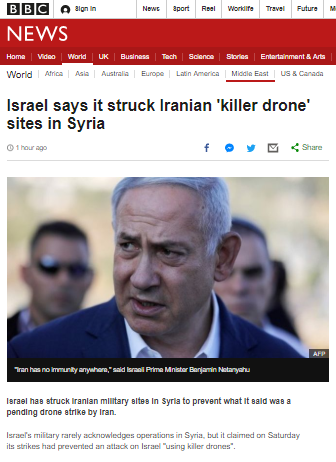On the morning of August 25th the BBC News website published a report originally headlined “Israel says it struck Iranian ‘killer drones’ in Syria to prevent attacks” on its Middle East page. The headline was later amended to read “Israel says it struck Iranian ‘killer drone’ sites in Syria”.
The article in fact relates to two separate incidents, the first of which took place over twelve hours before the publication of the BBC’s report. The BBC described that incident as follows:
“Israel has struck Iranian military sites in Syria to prevent what it said was a pending drone strike by Iran.
Israel’s military rarely acknowledges operations in Syria, but it claimed on Saturday its strikes had prevented an attack on Israel “using killer drones”. […]
An Israeli military spokesman said the strikes on Saturday targeted Iran’s Quds force in Aqraba, south-east of the capital, Damascus.”
A part of that story which the BBC chose not to tell – even though the information was readily available – is as follows:
“The Israeli military said its strike late Saturday targeted operatives from Iran’s Islamic Revolutionary Guard Corps’ Quds Force as well as Shiite militias who had been planning on sending “kamikaze” attack drones into Israel armed with explosives. […]
[IDF Spokesman] Conricus said Israel had monitored the plot for several months and on Thursday prevented Iran from making an “advanced attempt” to execute the same plan. Then, Iran tried again late Saturday to carry out the same attack, he said. […]
“This was a significant plan with significant capabilities that had been planned for a few months,” Conricus said. “It was not something done on a low level, but rather top down from the Quds Force.”
He said the Iranian attack was believed to be “very imminent.””
Neither did the BBC bother to inform its audiences that, as reported by Ha’aretz:
“A commentator close to the Revolutionary Guards wrote [on Thursday August 22nd] in the Iranian newspaper Kayhan that Israeli actions in Iraq and Syria would be met with surprises, such as launches of UAVs at sensitive security targets, ports and nuclear sites in Israel. The plan that was foiled, according to the IDF, was identical to the action threatened beforehand by the commentator.”
The BBC did choose to amplify Syrian claims:
“A Syrian military source quoted by the official Sana news agency said that Syrian anti-aircraft defences “detected enemy targets from Golan heading towards the area around Damascus”.
“The aggression was immediately confronted and so far the majority of the enemy Israeli missiles have been destroyed before reaching their targets,” the source said.”
BBC audiences were not informed that – despite those claims – at least three Hizballah operatives were reportedly killed.
By way of ‘context’ BBC audiences were told that:
“Israel is believed to have carried out hundreds of strikes in Syria since civil war broke out there in 2011, to try to prevent Iran gaining a foothold.”
While Israel has indeed carried out strikes in order to prevent both advanced weaponry reaching the Hizballah terror organisation and Iran’s entrenchment in Syria, that context is not relevant to this particular story, which is about the prevention of an imminent attack by Iranian forces on Israel. That fact of course explains why in this case Israel did release statements concerning the incident.
The second story in this report relates to an incident which took place a few hours later in Lebanon and which was portrayed by the BBC in the first two versions of the article as follows:
“Separately, reports said two Israeli surveillance drones had come down in a stronghold of the Iran-backed militant group Hezbollah in the Lebanese capital Beirut.
Hezbollah officials said an unmanned drone fell on the roof of a media centre belonging to the group, and was followed by a second unmanned drone that exploded in mid-air and crashed nearby.
Residents told the Associated Press they heard a large explosion that shook the area, after hearing the sound of an aircraft. Israel’s military declined to comment on the reports.”
Some two and a half hours after the report’s initial publication, the sub-heading “Blatant attack” was added along with comments from the Lebanese prime minister.
“Lebanese Prime Minister Saad Hariri called Israel’s alleged surveillance drones a “blatant attack on Lebanon’s sovereignty”.
“This new aggression… forms a threat to regional stability and an attempt to push the situation towards more tension,” he said in a statement.”
The BBC does not appear to have carried out any independent verification of the claims put out to news agencies by Hizballah – including the allegation that the drones were Israeli – before publishing its own report.
And so BBC audiences got superficial and incomplete reporting on two separate incidents based in no small part on second-hand claims made by ‘reliable’ sources such as the Hizballah terrorist organisation and the Assad regime.




